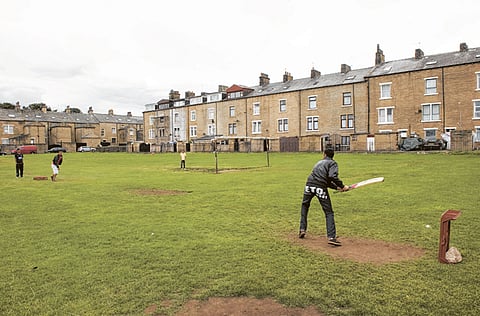Substituting runs for guns
In England, a duo employs the spirit of cricket to steer children away from rising youth crime

The bus stop on Forest Road in Walthamstow, eastern London, is swaddled in flowers. Two days earlier, a teenager called Ezekiel Amosu was killed under the wheels of a No 123 bus. Accounts differ. One theory is that he fell while running away from muggers. The police reckon he may have been pushed under the bus by a gang. No more than 365 metres away from where Ezekiel died, a set of yellow plastic stumps is being erected. Bats are being distributed to eager pairs of hands. This — a modest expanse of council-built tarmac flanked on three sides by imposing multistorey housing blocks — is cricket's new frontier.
Every Thursday evening at the Priory Court Estate in Walthamstow, cricket takes over. This is one of the country's most deprived neighbourhoods, with a long history of gang violence and gun and knife crime. Police used to be wary of setting foot in the area. Now the local bobbies turn up to play the children at cricket. The children win, of course. Around a year ago, the United Kingdom-based charity Cricket for Change began holding cricket sessions on the estate. At first only a few youngsters turned up, more out of curiosity than anything else. Slowly, though, they became hooked. They told their friends. At the start of this year, the Lord's Taverners, one of the country's oldest sports charities, came on-board. And on this freezing winter night, about 20 youngsters between 8 and 16 have turned up for another game. Everyone on the estate is aware of the recent death. In theory, there should be a chilling undercurrent to the evening. But as the balls are bowled and fours are hit, nothing could be further from anyone's mind.
Handing out the bats and taping up the balls (tennis balls, wrapped in masking tape, are used) is Adam Hall. The 23-year-old may be a cricket coach by trade but his expertise goes well beyond knowledge of the forward defensive stroke. Adam grew up on the estate, was a member of a gang and now works full-time to stop today's youth from strutting into oblivion. Attached to each week's cricket masterclass is a message. "Cut out the small things," Hall tells the group. "Let's say you tell someone to shut up. He says he'll punch you. Someone else says they'll come in and punch them harder. That's how little things turn into big things. So let's cut out the little things."
It is people like Adam — and his friend Perry, who also runs the sessions — who are key to the enterprise. Matthew Patten, the chief executive of the Lord's Taverners, explains: "We have 4,000 volunteers, most of whom have come through the cricket system. These kinds of areas are a foreign land to them." Instruction has to come from within. "The issue in Walthamstow is what you find pretty much everywhere," Hall says. "Marginalised children from disadvantaged backgrounds, surrounded by a whole load of issues."
The idea is to ensnare young people in sport before the gangs can get to them. According to the report on knife crime commissioned by the government from former soap actress Brooke Kinsella and published recently, the first year of secondary school is when most social ties are formed. By the age of 16, many crucial life choices have already been made. Hall admits that he was once "involved with the wrong people" but early enough for him to carve an alternative future. Now he is Young Cricket Coach of the Year and last year travelled to Chicago to speak to Michelle Obama about youth projects.
But why cricket? Why not chess, or basket-weaving? "Cricket is an individual game within a team game," Hall explains. "Football is the sort of game you can get lost in. I could play for half an hour and not touch the ball once. Here everyone gets a chance to bat, everyone gets a chance to bowl. It's like a gang but in a positive sense. It gives them a sense of belonging. They've never had that before. And they beat the police! The message we had at the end was that you can get one over on the police by playing cricket. You don't need to do it by robbing a corner shop."
Now they want to spread the word. Cricket for Change and the Lord's Taverners hope to expand street cricket to 20 cities over the next three years. There are plans for regional and national competitions that will culminate in a final at Lords. "The competition is crucial," Hall says. "These guys never leave this estate. To take them somewhere such as Lord's would be amazing." Meanwhile in Walthamstow, the quiet revolution continues to brew. "See those bigger guys?" Adam asks, pointing out a few teenagers. "They're the next me. They'll be the next people delivering these sessions." Do they know that yet? "They don't. They're involved in that process. The amazing thing is they don't realise. When Wesley there gets to a certain age, we'll start to inspire him. ‘Get your Level 1 coaching badge, start to help me out.' That's what I want to try across the country. Young people from estates are the best people to run these sessions."
Nobody is suggesting that the nation's youth-crime problem can be solved by an hour a week of cricket. But what estate cricket proves is that there are better ways of engaging the young than by beating them with a stick. All it needs is time, patience and a set of yellow plastic stumps.
-The Telegraph Group Limited, London 2011


